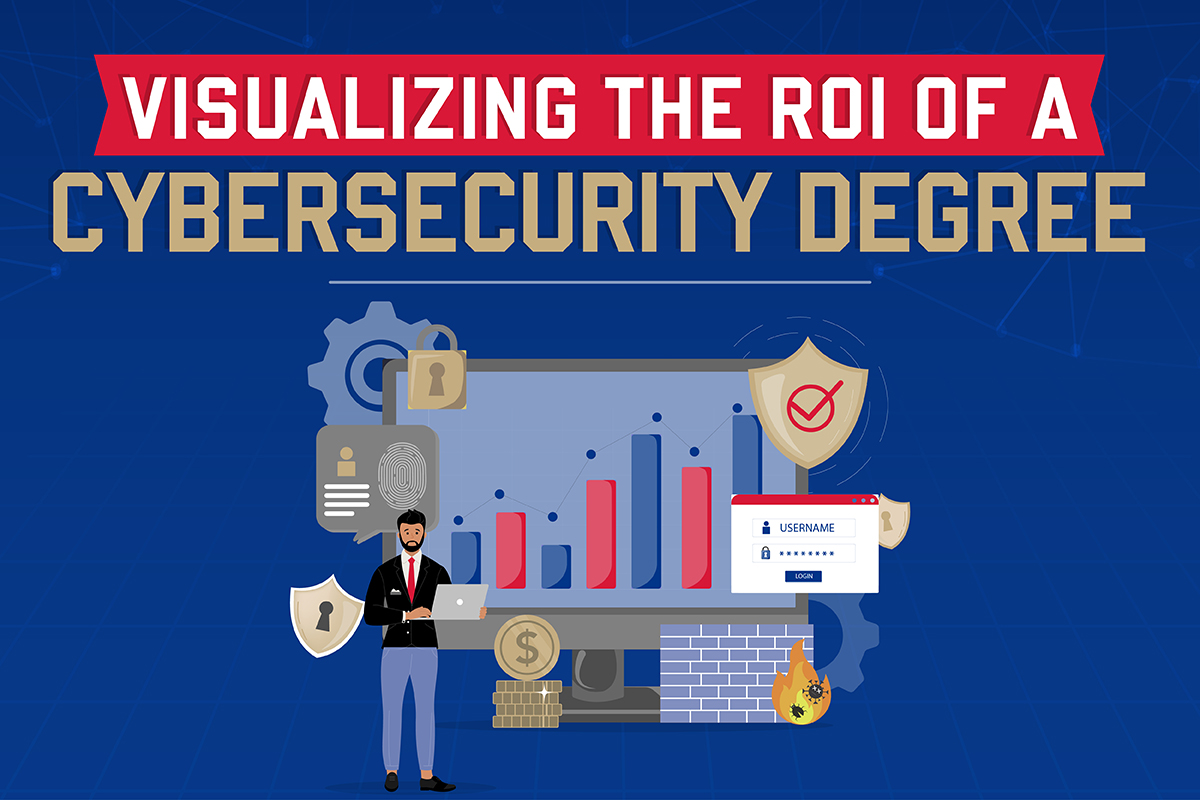Security Economics: Definition and Examples
Written by:
University of Tulsa
• Jan 29, 2025

As cyber threats continue to grow in sophistication and frequency, businesses across all industries are prioritizing cybersecurity more than ever. The challenge now lies not just in implementing stringent security measures but also in doing so efficiently and cost-effectively.
This is where the security economics definition comes into play. Security economics is an emerging interdisciplinary field that applies economic principles to cybersecurity decision-making. By evaluating the costs, benefits, and risks, security economics helps organizations allocate resources wisely, ensuring that security investments align with overall business goals while maximizing protection against ever-evolving cyber threats.
Understanding the concept is crucial to strategic cybersecurity management. It also helps aspiring professionals in the field identify opportunities that the right educational foundation can lead to.
Economics of Cybersecurity
Security economics is the application of economic principles to cybersecurity decision-making. It focuses on efficient resource allocation while mitigating cyber risks. It involves conducting a cost-benefit analysis to weigh the financial investment required for various security measures against the potential costs associated with cyber attacks or data breaches.
A key area of security economics is evaluating the financial implications of security investments, ensuring that spending aligns with the organization’s priorities and goals.
Another critical element is risk management, in which an organization assesses potential threats and assigns resources in a way that provides the highest level of protection at the lowest cost.
Importance of Security Economics in Business
Understanding the definition of security economics is essential for businesses navigating today’s cyber threat landscape. By applying economic principles to cybersecurity, organizations and their employees can make smarter decisions that balance protection, costs, and risk.
Security economics plays a key role across various industries.
Risk Management
Securing data helps businesses identify, assess, and prioritize cyber risks to implement effective mitigation strategies.
Resource Allocation
Effective security economics ensures that security budgets are spent wisely, delivering the greatest impact for every dollar invested.
Economic Efficiency
Security economics can help balance financial constraints with security effectiveness to maximize overall value.
Corporate Strategy
Security economics influences high-level decisions, such as mergers and acquisitions, by syncing security and business goals.
Industry Relevance
It is a critical area for industries that include finance, health care, and technology in which safeguarding sensitive data and assets is paramount to success.
Examples of Security Economics in Action
Real-world scenarios show how security economics influences business decision-making and enables an organization to achieve effective cybersecurity outcomes.
Example 1: Data Breach Risk Assessment
A retail company conducts a risk assessment in an effort to calculate the potential financial impact of a data breach, including regulatory fines, legal fees, and loss of customer trust. By comparing these costs with the required investment to strengthen its cybersecurity infrastructure, the company can determine a strategic spending plan to minimize risk without overspending.
Example 2: Investment in Cybersecurity Tools
A financial services institution evaluates the potential losses from cyber attacks, such as fraudulent charges or disrupted services. The analysis justifies investment in advanced threat detection software, as the cost of prevention is significantly lower than the potential damage associated with a successful attack.
Example 3: Cost of Compliance
A health care enterprise assesses the financial impact of compliance with global data privacy regulations, such as the EU’s General Data Protection Regulation (GDPR), to avoid penalties. Investing in secure infrastructure and compliance solutions not only minimizes legal risks but also engenders trust with stakeholders and patients.
These are just a few examples of how organizations use security economics to make better decisions that protect their operations, their bottom line, and their customers.
Career Paths in Security Economics
When considering the security economics definition, it can also be illuminating to examine career paths in the field.
The growing importance of cybersecurity has created a demand for trained professionals who can apply economic principles to security decision-making. This intersection of finance, risk, and cybersecurity is driving many career opportunities across a wide array of industries.
Cybersecurity Analysts
Cybersecurity analysts analyze the economics of cybersecurity. Ultimately, they evaluate the costs and benefits of implementing specific security measures. According to the U.S. Bureau of Labor Statistics (BLS), cybersecurity analyst roles are projected to grow by 33% between 2023 and 2033, significantly faster than the average for all other occupations.
Security Economists
Security economists focus on applying economic models to cybersecurity challenges, helping businesses align security investments with risk management processes. This career is gaining traction as organizations make data-driven, financially sound security decisions a top priority.
Risk Management Professionals
Risk management professionals are experts in assessing and quantifying the financial risks of security incidents. They play an important role in determining the most cost-effective strategies to minimize the likelihood of a cyber threat while ensuring business continuity.
Cybersecurity Consultants
As advisers, cybersecurity consultants guide businesses on economically efficient security strategies, helping them optimize spending while improving protection. According to Cybercrime Magazine, cybercrime is projected to cost the global economy $10.5 trillion annually by 2025, meaning that demand for skilled professionals will continue to rise.
Compliance Officers
Compliance officers, with a focus on ensuring that organizations adhere to industry regulations, such as the GDPR, also consider the financial implications of compliance. By balancing legal requirements with cost-effectiveness, they help companies avoid financial and legal penalties while maintaining public trust.
As cyber threats continue to increase, careers in security economics offer lucrative opportunities, combining technical expertise with strategic financial decision-making to address the evolving cybersecurity landscape.
Become a Cybersecurity Professional and Make an Economic Impact in Business
Pursuing a career in cybersecurity is a smart and forward-thinking decision as organizations increasingly rely on professionals who can balance security effectiveness with economic efficiency.
With the definition of security economics changing to address the growing complexity of cyber threats, skilled professionals are needed to guide businesses and keep them prepared and protected. Careers in cybersecurity not only offer job security and competitive salaries but also help ensure a company’s longevity and shape its strategic future.
If you’re ready to take the next step, consider the online Master of Science (M.S.) in Cyber Security from The University of Tulsa. The program provides the knowledge and skills needed to thrive in the field of security economics, preparing you for a leadership role in a sector that’s essential to today’s digital economy. Explore how you can make a meaningful impact while advancing your career.
Recommended Readings
How to Become an Ethical Hacker
What Is Machine Learning in Cybersecurity
Cybersecurity vs. Data Analytics: Similarities and Differences
Sources:
Cybercrime Magazine, “Cybercrime To Cost The World $10.5 Trillion Annually By 2025”
GDPR.EU, What Is GDPR, the EU’s New Data Protection Law?
Statista, Estimated Cost of Cybercrime Worldwide 2018-2029
U.S. Bureau of Labor Statistics, Information Security Analysts
U.S. Department of Homeland Security, Cyber Risk Economics
World Bank, Publication: Cybersecurity Economics for Emerging Markets


